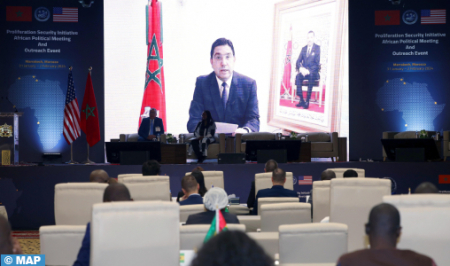In Line with HM the King’s Vision, Morocco Has Always Defended Multilateral Cooperation to Combat Proliferation of WMD – FM –
In line with the High Vision of His Majesty King Mohammed VI, Morocco has always defended multilateral cooperation as the most appropriate framework for coordinating international efforts to combat the proliferation of Weapons of Mass Destruction (WMD), said, on Wednesday in Marrakech, Minister of Foreign Affairs, African Cooperation and Moroccan Expatriates, Nasser Bourita. The Kingdom’s strong commitment in this area has led to its accession to almost all the international conventions on disarmament and non-proliferation, added the Minister in a statement by videoconference at the opening of the political meeting for the promotion of the Proliferation Security Initiative (PSI) dedicated to African countries, which runs until February 2 in Marrakech. Morocco has further provided constant support for international initiatives in this field and intends to continue its fruitful partnership with the United States of America and African countries to make the PSI an essential part of the African security landscape, added Bourita. The main asset of this international cooperation program, which aims to curb trafficking in weapons of mass destruction, their means of delivery and related materials, is “its flexible, operational and results-oriented nature,” he stressed, noting that the Marrakech meeting is the first of its kind to be held within the PSI framework “with such a high level of participation in terms of both rank and number”. Bourita pointed out that Morocco’s experience has demonstrated the relevance of the Initiative in terms of inter-ministerial coordination to meet the challenge of non-proliferation, adding that the Marrakech meeting is an excellent opportunity to strengthen the ownership of the ISP by the African States, through the implementation of the three priority actions. First, to recognize that the African security environment is not isolated from the global security context. Second, to strengthen synergies and complementarities with national efforts, by organizing more workshops and operational exercises led by African military and civilian experts. Third, to ensure that the voice of African states is heard within the PSI by identifying and sharing African lessons learned best practices in all the fora proposed by the initiative, the Minister explained. Africa’s growing presence within the PSI is an encouraging trend, he underlined, calling for building on this momentum to make the PSI a genuine platform for action by and for African states. Motivated by the strong commitment of African states to participate in global efforts against the proliferation of WMD, the PSI meeting in Marrakech is also dictated by profound changes in the African security context, he added. Four major trends will indeed shape the future of security on the African continent, and consequently our collective response to these challenges, Bourita said, citing, first and foremost, the increase in trade between Africa and the rest of the world on the one hand, and intra-African trade under the AfCFTA on the other. Although Africa only accounts for 2.7% of world trade, it accounts for 7% of world maritime trade and has a coastline 30,000 kilometers long, thereby making the African coastline the main source of vulnerability to proliferation-related threats, he explained. For the Minister, the second finding concerns the existence of “strong” and “irrefutable” evidence of enduring alliances between terrorist and separatist groups and transnational criminal organizations. Third, he added, the lack of regional and sub-regional cooperation, continues to affect the Continent’s ability to deal with transnational security threats, in the absence of genuine political will to change this state of affairs. Lastly, the Minister referred to the existence of “external actors” that continue to disrupt the continent’s security environment by disseminating low-cost and more devastating technologies and know-how to their proxies. These conditions are conducive to the proliferation of WMD, in the context of porous borders, coordination gaps, weak legal and regulatory frameworks and shortfalls in national capabilities, he concluded.

